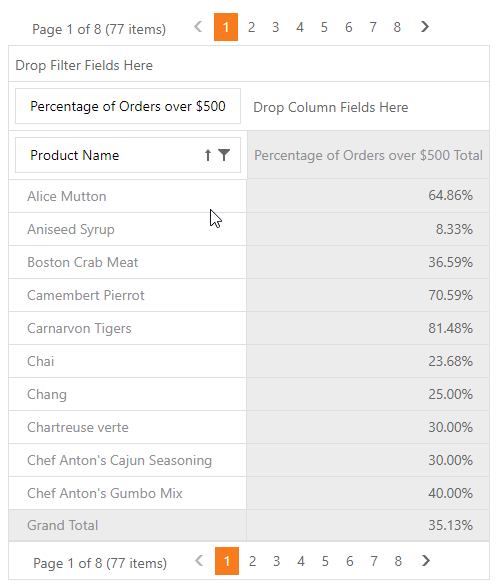ASPxPivotGrid.CustomSummary Event
Enables summary values to be calculated manually.
Namespace: DevExpress.Web.ASPxPivotGrid
Assembly: DevExpress.Web.ASPxPivotGrid.v20.2.dll
NuGet Package: DevExpress.Web
Declaration
Event Data
The CustomSummary event's data class is PivotGridCustomSummaryEventArgs. The following properties provide information specific to this event:
| Property | Description |
|---|---|
| ColumnField | Gets the column field that corresponds to the current cell. Inherited from PivotGridCustomSummaryEventArgsBase<T>. |
| ColumnFieldValue | Gets the value of the column field that corresponds to the current cell. Inherited from PivotGridCustomSummaryEventArgsBase<T>. |
| CustomValue | Gets or sets a custom summary value. Inherited from PivotGridCustomSummaryEventArgsBase<T>. |
| DataField | Gets the data field against which the summary is calculated. Inherited from PivotGridCustomSummaryEventArgsBase<T>. |
| FieldName | Gets the name of the data field against which the summary is calculated. Inherited from PivotGridCustomSummaryEventArgsBase<T>. |
| RowField | Gets the row field that corresponds to the current cell. Inherited from PivotGridCustomSummaryEventArgsBase<T>. |
| RowFieldValue | Gets the value of the row field that corresponds to the current cell. Inherited from PivotGridCustomSummaryEventArgsBase<T>. |
| SummaryValue | Gets an object that contains the values of the predefined summaries which are calculated for the current cell. Inherited from PivotGridCustomSummaryEventArgsBase<T>. |
The event data class exposes the following methods:
| Method | Description |
|---|---|
| CreateDrillDownDataSource() | Returns data records associated with the current cell. Inherited from PivotGridCustomSummaryEventArgsBase<T>. |
Remarks
The ASPxPivotGrid calculates summaries against data fields. A field’s PivotGridFieldBase.SummaryType property specifies the type of summary function. The control automatically calculates all the predefined summary functions (see the PivotSummaryType topic for a list of the available functions) and it allows custom summaries to be calculated manually using the CustomSummary event.
To calculate a custom summary for a specific data field, set its PivotGridFieldBase.SummaryType property to PivotSummaryType.Custom. In this instance, the CustomSummary event fires for each cell that corresponds to this data field. Use the PivotGridCustomSummaryEventArgsBase<T>.DataField property to identify the data field.
To identify the kind of a processed cell, you can use the PivotGridCustomSummaryEventArgsBase<T>.ColumnField and PivotGridCustomSummaryEventArgsBase<T>.RowField properties.
- If ColumnField or RowField is null, it means that the processed cell is a Grand Total.
- If both ColumnField and RowField are last fields in the corresponding area, this means that this is an ordinary cell.
- In other cases, this is a Total cell.
For example, you can handle the CustomSummary event to calculate custom summaries against multiple fields, particular records, etc. Use the PivotGridCustomSummaryEventArgsBase<T>.CreateDrillDownDataSource method to get a list of records that correspond to the processed cell. This list can then be traversed to calculate a custom summary. The custom summary value should be assigned to the PivotGridCustomSummaryEventArgsBase<T>.CustomValue property.
The ASPxPivotGrid calculates all the predefined summaries (AVERAGE, MIN, MAX, SUM, etc.) for each cell. The calculated summaries can be accessed using the PivotGridCustomSummaryEventArgsBase<T>.SummaryValue property and used in custom summary calculations.
Example
This example demonstrates different approaches to calculate a custom summary.
The task is to calculate the percentage of units that cost over $50 and show that value in the total columns.

The following approaches are shown:
The CustomSummary event. A custom summary is calculated for the “Unit Price” field. The field’s SummaryType property is set to PivotSummaryType.Custom. The
ASPxPivotGrid.CustomSummaryevent is handled to count the records whose total sum exceeds $50. The ratio of these records to all the records is assigned to the e.CustomValue parameter.An unbound expression. A field is an unbound field with an expression that calculates the ratio.
Data Binding API. In Optimized mode create a field bound to the ExpressionDataBinding object with the following expression:
ToDecimal(Sum(iif([Extended_Price]>=500,1,0)))/Count()
- DataBindingApiExample.aspx
- ExpressionExample.aspx
- EventExample.aspx
- EventExample.aspx.cs
- EventExample.aspx.vb
<dx:ASPxPivotGrid ID="ASPxPivotGrid1" runat="server" DataSourceID="AccessDataSource1" Theme="Office365">
<OptionsData DataProcessingEngine="Optimized" />
<Fields>
<dx:PivotGridField ID="fieldProductName" Area="RowArea" AreaIndex="0"
Caption="Product Name" FieldName="ProductName">
</dx:PivotGridField>
<dx:PivotGridField ID="fieldExtendedPriceNew" Area="DataArea" AreaIndex="0"
Caption="Percentage of Orders over $500">
<DataBindingSerializable>
<dx:ExpressionDataBinding Expression="ToDecimal(Sum(iif([Extended_Price]>=500,1,0)))/Count()" />
</DataBindingSerializable>
<CellFormat FormatString="p" FormatType="Numeric"></CellFormat>
</dx:PivotGridField>
</Fields>
</dx:ASPxPivotGrid>